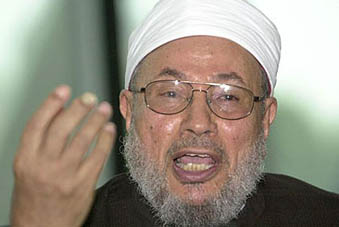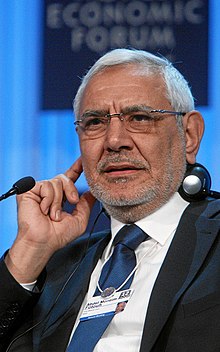
The pious Muslim jurist Yūsuf Qaraḍāwī named all non-Muslims with every moral defect that he enumerates one by one, in order to show the differences between a Muslim society and a non-Muslim society. He then proceeds to award the Muslim society all the positive characteristics, because it is a ‘divine, balanced, humane society’ and so on.
THEN YOU SUDDENLY discover that this comparison being made between the reality of non-Muslims and the Muslim society that the Shaykh is calling upon us to establish, since it is presently a society that doesn’t exist. It is thus comparison between the reality of the people of the West, and an illusion and dream of a society. Leaving aside the title of a book dedicated to The features of the Muslim society that We Seek, his eminence Shaykh Qaraḍāwī – after the passage of one thousand and four hundred years and a quarter of a century – is seeking out for us the features of the Muslim society that will certainly be established God willing (because it is still in the stage of wishing), the one ‘we seek’. How many centuries do we have to wait for this, I wonder?
Is there any gross imbalance in the morals of Muslims, in lying to oneself, that is more apparent than this? This man was a leading figure, and his fatwā had a great impact, which we saw in the massacres carried out in Iraq and other Muslim and non-Muslim countries. So look at what he says, surprisingly, without a hint of him or any of his followers feeling any shame or astonishment! “O my! O such cowards!” to quote the words of Shaykh Sayyid Darwīsh, one of the eminent figures in the renaissance of Egypt, when speaking about the fatwās of these modern shaykhs.
Qaraḍāwī then emotionally repeated the comparison between the non-Muslim society and the imaginary Muslim society, and gave us a lengthy description of this Muslim society, which I can summarise as:
a society of justice, charity, righteousness, mercy, honesty, trust, patience, loyalty, modesty, chastity, pride, assistance, generosity, courage, dedication, honour, sacrifice, manliness, cleanliness, beautification, purposefulness, moderation, tolerance, forbearance, cooperation and zealousness concerning sanctities, far above base desires, a society of altruism towards others, kindness to all creation, of honouring one’s parents, upholding the ties of kinship, honouring one’s neighbor, of loyalty to Him, repentance to Him, and trust in Him. It is a society that forbids all vice to the point of holding low morals to equate to grievous sins, a society that criminalizes alcohol, gambling, adultery and homosexuality, one that prohibits disobedience to parents and harming others by deed or word, and holds lying, betrayal, treachery, breaking promises and abusive litigiousness as marks of the hypocrite.[1]
The shaykh thus mustered against modern values all the imaginary virtues his heart could contrive from his Bedouin dreams, to establish when possible, the desired society in the land, one that would meet the aspirations and dreams of Muslims for ‘the city virtuous’ that has never existed on earth. He vaunts is superiority over the values and morals of the naked, lecherous, debauched infidels! His is a pride for what he does not in reality possess, as evidenced by his desire for it and his outlines for it, a pride of the lying, impoverished, ignorant, insignificant, naked ailing Arab who proclaims:
We are such folk that when a newborn is born among us the brows of kings prostrate before him
Another poet expressed the values of the Arabs in zero-sum enmity by saying:
We brook no mediator with us; if we are not in primacy over all the world, we prefer to die.[2]
Reality, it turns out, has given him the grave without all the world.
Moral values are not the private property of one people to the exclusion of another, and there is no division in them between Arabs or non-Arabs
Brother Abū al-Futūḥ cannot imagine anything from a Muslim other than honesty and trustworthiness for the simple fact of his being a Muslim. And if he meant the Muslim Brotherhood exclusively, then he is portraying them for us as some group of pure angels. When compared to the reality his words come across as merely the poetry of self-deceiving pride, for the brows of tyrants and kings are not prostrating to him. Nor is anything of this true, it is just promotional slogans, nothing more.
Do we not see them proclaiming usury prohibited, yet circumventing this in Islamic banks with a thousand tricks that are entirely usurious – otherwise they would collapse among the global stock exchanges. And they do this while they fully know that:,
“Woe to those who distort the Book with their hands while they know!”[3]
They thus deceive their Lord openly and visibly. What neurological and mental illness is this that has befallen the Muslim conscience?
Qaraḍāwī and Abū al-Futūḥ talk about honour, but they fail to declare matters as no longer appropriate when based on rulings from Qur’ānic verses whose time has expired. Instead, they talk about freedoms and establish a complete jurisprudence of slavery that our children study in religious schools to this day.
They talk about human rights – a contemporary concept that has never existed in our history or in the history of others in those ancient times, yet at the same time they fail to recognize any rights for non-Muslims, on the grounds that they are infidels outside of humanity; so humanity is for Muslims alone.
They talk about the right to security and peace, but they see the homelands of others as theatres of war, and ranking high in Sharīʻa is assaulting a non-Muslim, killing him, despoiling him, plundering and capturing his women and children according to the doctrine of ‘loyalty and disavowal’,[4] and jihad.
Values are not to be subjected to the criterion of right and wrong, but rather to the criterion of what is permitted and forbidden
The Muslim shaykh, when he lies to himself and to the Muslims, whether he be a preacher and an authority for everyone like Qaraḍāwī or a political activist like Abū al-Futūḥ, turns into a charlatan with respect to moral values.Isn’t he a fraud if he accords a value to one thing while denying it to something equivalent? Isn’t he a hoodlum if he gathers witnesses about him to proclaim that some have moral values while others do not – in so doing granting that which he does not possess, in order to set apart those who do not deserve the glad tidings from those who do? Do you see where this fantasy in the Muslim minds is leading to?
The one who does not possess it is brazenly giving to one who does not deserve it, in broad daylight, with witnesses, in words and rhetoric – just like that, mere words that have no basis in reality. Whoever declares himself a bestower of values , or claims original ownership of these is an evil charlatan, because moral values are not the private property of one people to the exclusion of another, and there is no division in them between Arabs or non-Arabs. Values are inherent parts of an object or its reality, and come into being when discovered and activated in any time or place.
Muslims, however, are generously and liberally granting themselves values to the point of vulgarity, on the grounds that the One who grants these is the Lord of Muslims who singled out this people alone for this gift, to the exclusion of all the rest of God’s children on earth put together, and Who declared it ‘the best nation brought forth for mankind.’[5]
Thus, he denies positive moral values to all non-Muslims and when he talks about human rights, he does not grant the women in our lands rights like males as a sense of justice would demand, because this right appeared specifically among Westerners who are without morals since they are non-Muslims. In this way he denies progress on the basis of non-Muslims’ values because, according to him, values are not to be subjected to the criterion of right and wrong, benefit and harm, or good and evil, but rather to the criterion of what is permitted and forbidden as a fixed divine value system that does not accept any change or development.

Suggested Reading
Here there will follow a discussion of human rights, such as freedom to choose one’s belief, or freedom to critique a religion as an academic research topic, or freedom to criticise the survival to the present day of the jurisprudence of slavery in our religious institutes. But all of this will be written off as western conceptions from lands whose people live a ‘bestial life’, as they are described in the Book of Tawḥīd – a set text for early secondary school years in blessed Saudi Arabia. In exactly the same way there will be a discussion on freedom – an infidel concept that is against religion since it in religion there is ‘the setting free of a slave.[6] And how could we possibly set him free if we do not implement the jurisprudence of slavery and act upon it when we reopen the country to our ‘enlightening’?
The distortion occurs as a result of granting values to ourselves while depriving others of them. We therefore fail to understand those people and they cannot understand us. We become two entirely separate worlds at a time when the whole world is coming together. The distortion means that the Muslim does not realise that freedom is a value, or that any value is unconnected with any religion, since values are what we understand today by high values. If these had existed in any religion, they would have ordered the prohibition of slavery immediately. But no religion did this because such was the logic of their time and the systems of their era.
[1] Y. Qaraḍāwī, ملامح المجتمع المسلم الذي ننشده (‘Features of the Muslim Society We Seek), Maktabat al-Wahba, 2001, pp.90-91.
[2] This is from the poet Abū Firās al-Ḥamdānī (932-968 AD) and the line is familiar to all Arab schoolchildren. (Ed.)
[3] The author is referencing Qur’ān II (al-Baqara), 75 and 79: Woe, then, to those who write the book with their hands … and they know this. (Ed.)
[4] See Glossary: ‘Al-Walā’ wal-Barā’
[5] The author is referencing Qur’ān III (Āl ‘Umrān), 110: You are the best of the nations raised up for (the benefit of) men; you enjoin what is right and forbid the wrong and believe in Allah; and if the followers of the Book had believed it would have been better for them; of them (some) are believers and most of them are transgressors. (Ed.)
[6] The author is referencing Qur’ān XC (al-Balad), 12-13: And what will make you comprehend what the uphill road is? (It is) the setting free of a slave. (Ed.)
See Part One of this essay here

